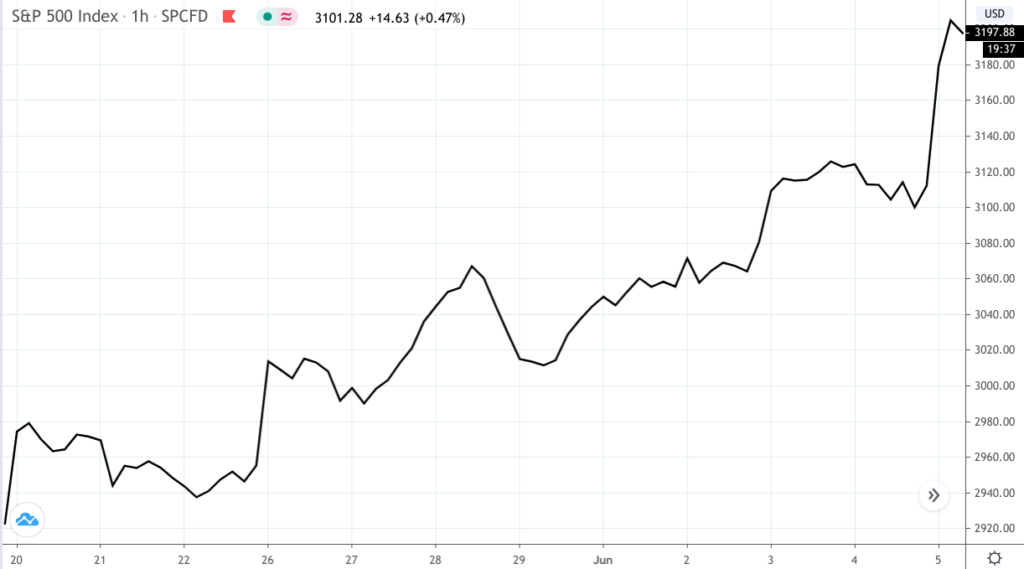The recent protests, coming on the heels of a months-long COVID-19 lockdown, appear to threaten not only the already-frayed social fabric that makes up American society, but also the ideals of American democracy as we’ve imagined it for over two centuries.
You’d think that such concerns would, in turn, affect investor sentiment negatively, as there’s no stable market without a stable society–so goes the logic, but the cause and effect is not so obvious.
To evaluate the relation between current social unrest and market activity, let’s look at the market at between May 20 – June 5:
S&P 500 (SPX) – May 20 to June 5, 2020 (Data source: Tradingview)

Looking at the S&P 500’s performance since the beginning of the protests, the social unrest appears to have made no difference at all. As Jim Cramer put it, “At the end of the day, the market has no conscience. Investors are simply trying to make money, and that’s why they’re crowding into the stay-at-home economy stocks.”
Let’s assume that unless societal tensions escalate toward something economically disastrous such as, say, a second civil war, the economic segment of America’s conscience might bear no correlation to the social issues affecting the country. Unless businesses, on a local to nationwide scale, are severely disrupted, basic market operations and speculations toward shareholder value may remain intact.
Economics and sentiment are two separate things that sometimes can affect one another but generally exist in two distinct realities. Think of it on a personal level: you can be a happy person or even a miserable person regardless of your personal wealth status.
Although money can be pumped into social causes, money knows no social ethics. Money can be used to back actions just and unjust. It doesn’t really matter. Why? Because money recognizes only one thing: it’s own flow or lack there of.
Please be aware that the content of this blog is based upon the opinions and research of GFF Brokers and its staff and should not be treated as trade recommendations. There is a substantial risk of loss in trading futures, options and forex. Past performance is not necessarily indicative of future results.
Disclaimer Regarding Hypothetical Performance Results: HYPOTHETICAL PERFORMANCE RESULTS HAVE MANY INHERENT LIMITATIONS, SOME OF WHICH ARE DESCRIBED BELOW. NO REPRESENTATION IS BEING MADE THAT ANY ACCOUNT WILL OR IS LIKELY TO ACHIEVE PROFITS OR LOSSES SIMILAR TO THOSE SHOWN. IN FACT, THERE ARE FREQUENTLY SHARP DIFFERENCES BETWEEN HYPOTHETICAL PERFORMANCE RESULTS AND THE ACTUAL RESULTS SUBSEQUENTLY ACHIEVED BY ANY PARTICULAR TRADING PROGRAM.
ONE OF THE LIMITATIONS OF HYPOTHETICAL PERFORMANCE RESULTS IS THAT THEY ARE GENERALLY PREPARED WITH THE BENEFIT OF HINDSIGHT. IN ADDITION, HYPOTHETICAL TRADING DOES NOT INVOLVE FINANCIAL RISK, AND NO HYPOTHETICAL TRADING RECORD CAN COMPLETELY ACCOUNT FOR THE IMPACT OF FINANCIAL RISK IN ACTUAL TRADING. FOR EXAMPLE, THE ABILITY TO WITHSTAND LOSSES OR TO ADHERE TO A PARTICULAR TRADING PROGRAM IN SPITE OF TRADING LOSSES ARE MATERIAL POINTS WHICH CAN ALSO ADVERSELY AFFECT ACTUAL TRADING RESULTS. THERE ARE NUMEROUS OTHER FACTORS RELATED TO THE MARKETS IN GENERAL OR TO THE IMPLEMENTATION OF ANY SPECIFIC TRADING PROGRAM WHICH CANNOT BE FULLY ACCOUNTED FOR IN THE PREPARATION OF HYPOTHETICAL PERFORMANCE RESULTS AND ALL OF WHICH CAN ADVERSELY AFFECT ACTUAL TRADING RESULTS.